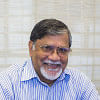
Ahrar Ahmad
Dr Ahrar Ahmad is professor emeritus at Black Hills State University in the US, and director general of Gyantapas Abdur Razzaq Foundation in Dhaka.
Dr Ahrar Ahmad is professor emeritus at Black Hills State University in the US, and director general of Gyantapas Abdur Razzaq Foundation in Dhaka.
The cruelties of the genocide, and the heroism of the resistance were all parts of the people’s lived experience.
An incredible opportunity has been created to build a more democratic, just and beautiful Bangladesh.
Even though transparent, participatory and competitive elections are a constitutional right, the realities today have vitiated those expectations.
A great university inspires and prepares students for a rich and fulfilling experience in a changing and challenging world.
Shorn of its sacred grandeur the Padma has embraced its secularised and earthier image with some muscularity, audacity and flair.
What makes a good student? A definitive answer to this question is difficult.
Today, the question of being a 'good teacher' generates a new vernacular.
The cruelties of the genocide, and the heroism of the resistance were all parts of the people’s lived experience.
An incredible opportunity has been created to build a more democratic, just and beautiful Bangladesh.
Even though transparent, participatory and competitive elections are a constitutional right, the realities today have vitiated those expectations.
A great university inspires and prepares students for a rich and fulfilling experience in a changing and challenging world.
Shorn of its sacred grandeur the Padma has embraced its secularised and earthier image with some muscularity, audacity and flair.
A great classroom is one that is conducive to learning.
What makes a good student? A definitive answer to this question is difficult.
Today, the question of being a 'good teacher' generates a new vernacular.
The two words in the title are evocative, complex and slippery. What after all is “home”, and what does “displacement” really mean?
The “idea” of a constitution may be old. After all even Aristotle had written about them.